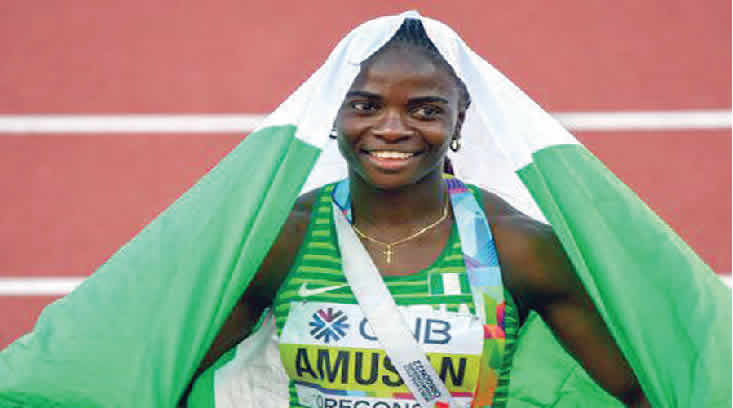Sprinting Prowess and Emerging Talents:
Nigeria’s sprinting legacy, particularly in the men’s 100m, is marked by Olusoji Fasuba’s enduring national record of 9.85s, a testament to his exceptional speed. While this record once held the African title, it has since been surpassed by Akani Simbine and Ferdinand Omanyala. Blessing Okagbare’s 10.79s in the women’s 100m stands unmatched nationally, despite her career’s controversial end due to doping allegations. Her multiple sub-10.90s performances highlight the significant gap between her and her contemporaries. In the 200m, Divine Oduduru’s 19.73s holds the national record and ranks among Africa’s fastest times. Udodi Onwuzurike’s matching of Oduduru’s second-fastest time of 19.76s signals the potential emergence of a new generation of sprinters. Favour Ofili’s remarkable 21.96s in the women’s 200m not only shattered the previous record but also cemented her position as a global sprinting force.
Quarter-Mile Dominance and Middle-Distance Challenges:
Nigeria’s history in the 400m boasts notable achievements, with Innocent Egbunike’s 1987 national record of 44.17s still standing as a benchmark. Emmanuel Bamidele’s recent attempt, clocking in at 44.24s, demonstrates the ongoing pursuit of excellence in this event. Falilat Ogunkoya’s 49.10s in the women’s 400m, achieved at the 1996 Atlanta Olympics, remains both a national and African record. The absence of sub-50s performances in recent years underscores the need for renewed focus on talent development in this category. Edose Ibadin’s consistent dominance in the men’s 800m, with a national record of 1:44.65, highlights his prowess over the past five years. Fatimoh Muhammed’s 2007 record of 2:01.89 in the women’s 800m remains unbroken, despite commendable efforts by other athletes. Reaching the sub-2-minute mark remains a target for Nigerian women in this event.
Long-Standing Records and the Need for Progress:
The 1500m records reveal a stagnation in Nigerian middle-distance running. Ado Maude’s 1991 time of 3:42.85 for men and Victoria Moradeyo’s 1999 time of 4:17.1 for women highlight the long-standing nature of these records. Recent performances by Ronke Akanbi and Comfort James offer a glimmer of hope for a resurgence, but significant development is essential to bridge the gap with international standards. Tobi Amusan’s extraordinary 12.12s in the 100m hurdles, achieved at the 2022 World Championships, not only set a new world record but also solidified her place as a dominant force in Nigerian athletics. Her consistent sub-12.30s performances further underscore her exceptional talent and dominance within the top 10 national rankings. Ezekiel Nathaniel’s impressive 48.00s in the men’s 400m hurdles represents a breakthrough for Nigerian athletes in this event, surpassing the achievements of previous generations. His continuous improvement over just two years demonstrates his potential for even greater success.
Hurdles, Long Distances, and Road Events: A Call for Development:
Ajoke Odumosu’s 2012 record of 54.40s in the women’s 400m hurdles remains a testament to her dominance during that period, with her times still holding strong positions within Nigeria’s top 10 rankings. Nigeria’s records in long-distance events reveal a concerning lack of progress. Decades-old records in the 5000m and 10,000m, held by Amina Olowora and Itsifamus Choolon respectively, underscore the urgent need for investment in training and development for these disciplines. Deborah Pam’s efforts, while commendable, highlight the challenges faced by athletes in these events. Similarly, in the marathon, Nigeria lacks official records that meet international elite standards, with Mohamed Abbas’s 2:16:06 and Mary Akor’s 2:40:37 representing the current benchmarks. The absence of competitive times in race walking further emphasizes the need for greater focus and support in these events. Fadekemi Olude’s 2021 time of 1:40:05 in the women’s 20km race walk, while a national mark, falls short of global standards. Moreover, the lack of official records on the men’s side underscores the need for increased participation and development in this discipline.
The 2024 National Sports Festival: A Platform for Change and Renewal:
The upcoming 2024 National Sports Festival carries significant weight, not only as a showcase of athletic talent but also as a pivotal moment for Nigerian sports. The potential for records to be broken, for new stars to emerge, and for established athletes to further cement their legacies creates an atmosphere of excitement and anticipation. The festival serves as a vital platform for identifying and nurturing talent, for raising the overall standard of Nigerian athletics, and for inspiring future generations of athletes. The performance of the athletes in this festival will be a critical indicator of the state of Nigerian athletics, highlighting areas of strength and weakness. It will also serve as a springboard for athletes aiming to compete on the international stage, particularly with the Paris 2024 Olympics on the horizon.
Looking Ahead: The Future of Nigerian Athletics:
The analysis of Nigeria’s current national records reveals a complex picture. While certain events boast impressive achievements and promising young talents, others are marked by stagnation and a need for revitalization. Addressing these challenges requires a multifaceted approach, including increased investment in coaching and training facilities, targeted talent identification programs, and the creation of a supportive ecosystem for athletes. The 2024 National Sports Festival serves as a crucial opportunity to evaluate progress, identify emerging talent, and set the stage for a brighter future for Nigerian athletics. Success at the international level requires not only exceptional individual athletes but also a robust and well-structured support system. The coming years will be critical for Nigeria to strengthen its position in the global athletic arena and to fulfill the potential of its talented athletes.














